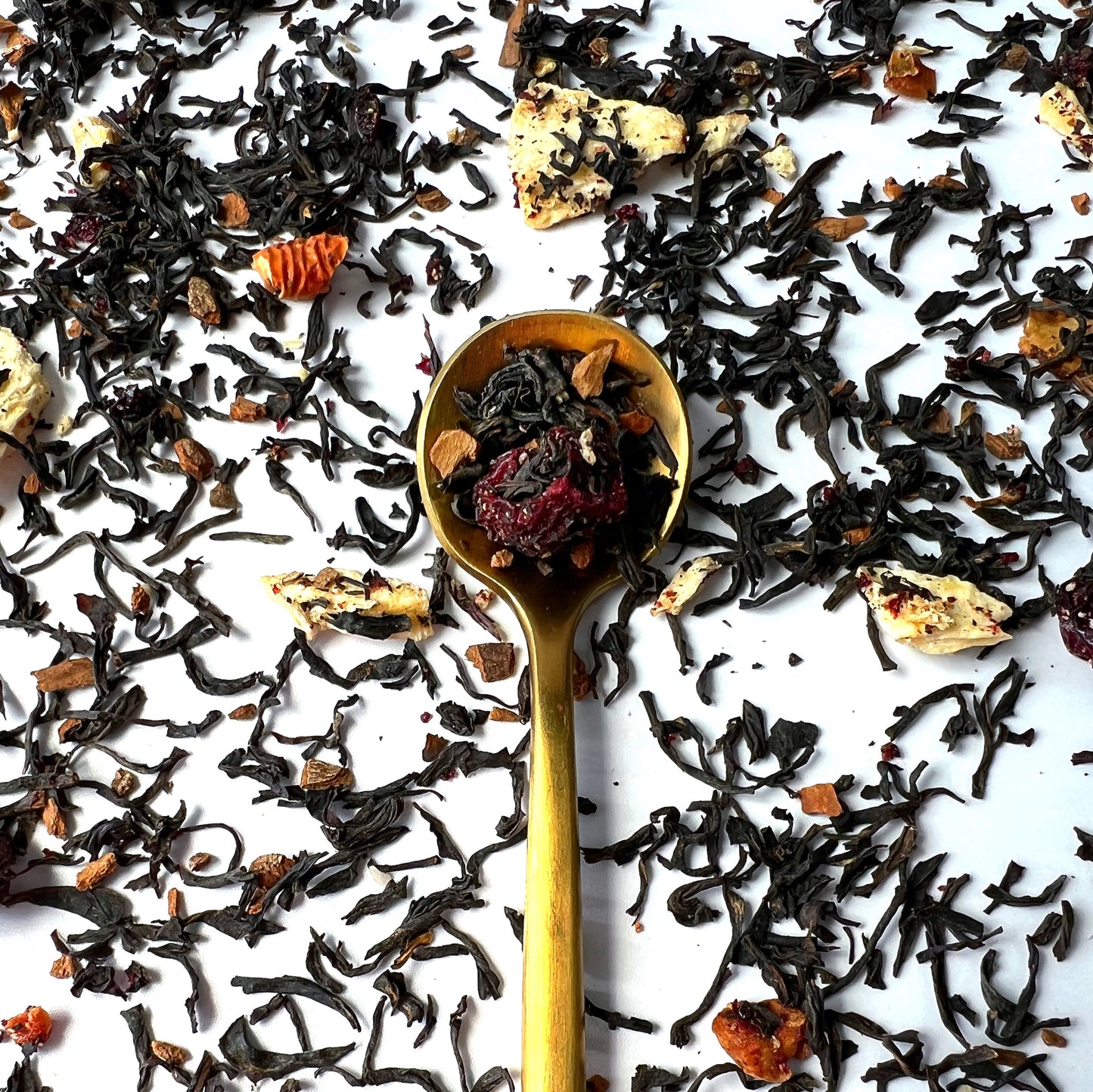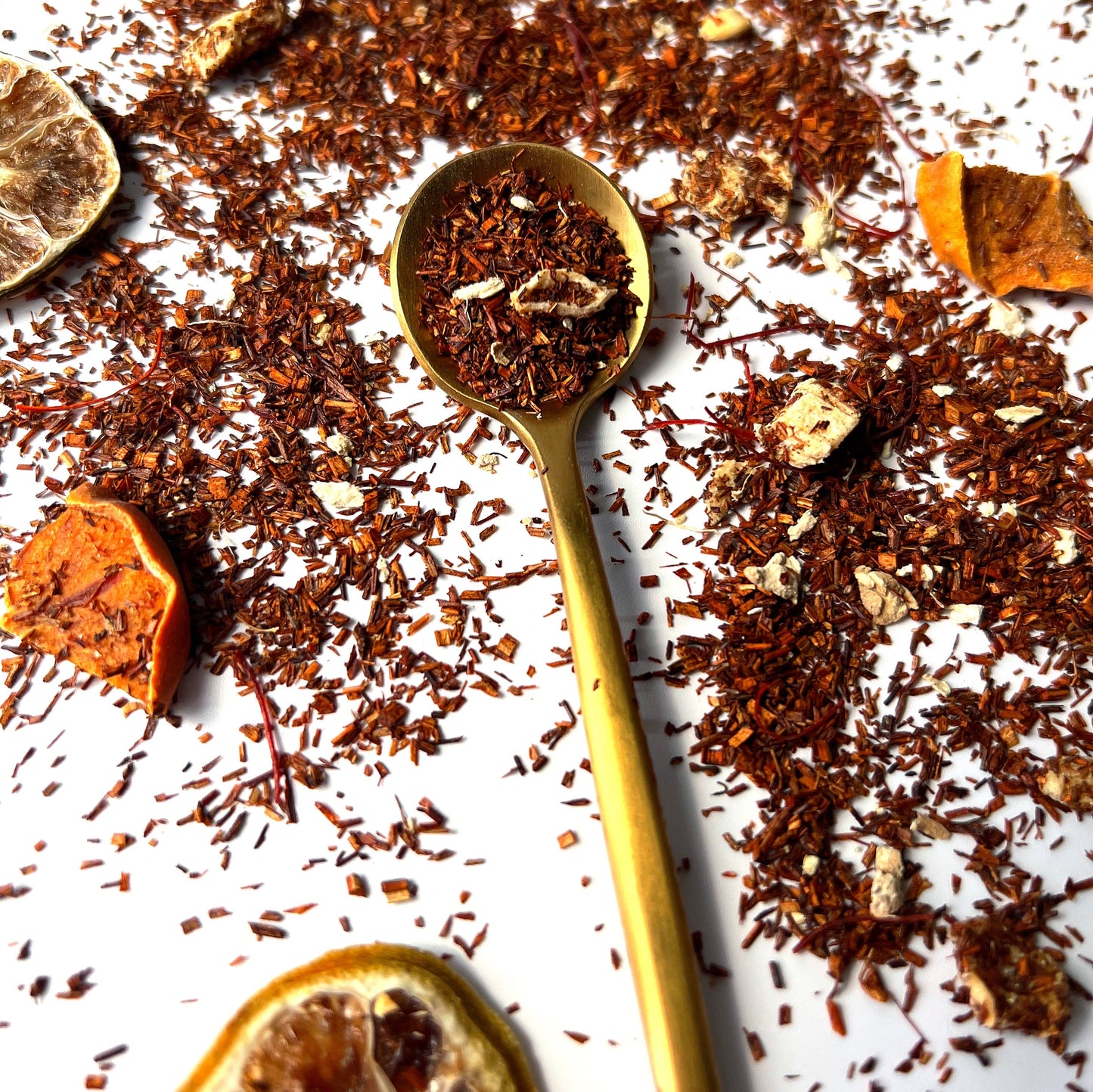This store requires javascript to be enabled for some features to work correctly.

There are many types of tea produced and they are all made from the leaves of a very beautiful, versatile evergreen plant called the camellia sinensis. These are often called "True Teas." Green teas are unoxidized, retaining nutrients and freshness. Black teas are fully oxidized producing more malty and full bodied flavors. White teas, the least processed tea, is slightly oxidized and retain "pekoe" or white fuzz from early picking. Though different, each type of tea has its unique flavor and benefit. See below!
Benefits of Black Tea
"Unlike other teas, black tea leaves undergo an extensive oxidation process, exposing the cells inside the leaves to oxygen. Experts believe this oxidation may give black tea some different benefits than green tea (which receives no oxidation). Both oolong and white teas undergo partial oxidation."
Black tea contains one group of polyphenols, called theaflavins, that no other type of tea has. Theaflavins develop during oxidation and account for 3% to 6% of the polyphenols in black tea."
- Promotes heart health
- Reduces the risk of stroke
- Improves focus
- Lowers blood sugar
- Decreases risk of some cancers
Source: UCLA Health: 6 health benefits of drinking black tea
Benefits of Green Tea
"Green tea is loaded with antioxidants. Among its benefits, it may help support brain function and fat loss, help reduce the chance of developing heart disease, and offer some protection against cancer."
- Contains healthy bioactive compounds
- May improve brain function
- Increases fat burning
- High in antioxidants that may lower cancer risks
- May protect brain from aging
- Reduces bad breath
- May prevent type 2 diabetes
- May help with cardiovascular disease
- May help with weight loss
- May help you live longer
Benefits of White Tea
"White tea is made from the Camellia sinensis plant.
Its leaves and buds are picked just before they are fully open, when they’re covered in fine white hairs. This is where white tea gets its name.
Green tea and black tea are also made from the Camellia sinensis plant. However, different processing methods give them their unique flavors and aromas.
White tea is the least processed of the three teas. Because of this, it retains a high amount of antioxidants."
- Rich in antioxidants
- May reduce risk for heart disease
- May help with weight loss
- Protects teeth from bacteria
- Has cancer fighting compounds
- May lower risk for insulin resistance
- Compounds may protect you against osteoporosis
- May help with skin aging
- May help protect you against parkinson's or alzheimer's
Other Tea types + benefits
Purple Tea
- Rich in antioxidants
- Cancer fighting properties
- Anti-inflammatory
- Anti-viral
- Reduces cholesterol
- Improves immune health
- Improves cognition
Source: Purple Tea Benefits
Yellow Tea
- Anti-inflammatory
- Loaded with antioxidants
- Boost immune system
- Helps with digestions
- Improves hearth health
Source: Yellow Tea
Oolong
- Lowered risk for diabetes
- Improved heart health
- Improved cognition
- Mineral rich
Source: Health Benefits of Oolong
Pu'erh
- Boosts liver health
- Helps with weight loss
- Inhibits cancer growth
- Improves cholesterol
Source: Pu-erh Tea Benefits

What is a tisane?
Tisanes, also known as "herbal teas" are herbal blends + infusions of aromatic herbs, plants and plant parts like stems, roots, bark, flowers, seeds, fruit, and leaves. Tisanes are known for their healing properties + indigenous medicines.
Tisanes are technically not "teas" at all as they are not made from the camellia sinensis plant (tea plant).
Popular Herbs + Plants used in tisanes
Roots
- Licorice
- Burdock
- Dandelion
- Chicory (coffee substitute)
- Ginger
- Turmeric
- Marshmallow
- Milk Thistle
Barks
- Cinnamon
- Wild cherry
- Willow bark
- Slippery elm
Flowers
- Chamomile
- Lavender
- Hibiscus
- Rose
- Red clover blossoms
- Calendula
- Lime flower
- Linden
- Chrysanthemum
- Elderflower
Leaves
- Lemongrass
- Lemon balm
- Sage
- Marjoram
- Mint
- Rooibos
- Mulberry leaf
- Blackberry leaf
- Tulsi
- Basil
- Rosemary
- Tarragon
- Yerba mate (High in caffeine)
Fruits + Seeds
- Elderberries
- Rose hips
- Citrus peels (orange, lemon)
- Fennel
- Cardamom
- Star Anise
- Various dried fruits
Benefits of Rooibos + Honeybush
Rooibos
"Rooibos tea is also known as red tea or red bush tea. It is made using leaves from a shrub called Aspalathus linearis, usually grown on the western coast of South Africa.
Rooibos is a herbal tea and is not related to black or green tea."
- Caffeine free + low in tannins
- Packed with antioxidants
- May boost heart health
- May reduce cancer risks
- May help folx with diabetes
Source: 5 Health Benefits of Rooibos Tea (Plus Side Effects)
Honeybush
"Honeybush, or Cyclopia spp., is a shrub that grows in the Eastern and Western Cape regions of South Africa.
It’s closely related to rooibos. It’s also caffeine-free, nutritious, and contains very small amounts of a variety of minerals, as well as beneficial plant compounds that have antioxidant activity.
You may enjoy a warm cup of this tea as part of your nighttime routine, or pour it into an ice-filled glass to make iced tea."
- Rich an antioxidants
- May help with diabetes
- May improve bone health
- May have cancer fighting properties
- Boosts skin health
Herbs for Anxiety + Depression
- Lavender
- Valerian root
- Kava
- Passionflower
- Turmeric
- Chamomile
- Ashwagandha
- St. John’s wort
- lemon balm
- Saffron
- Turmeric
- Basil
- Milky oats
Calming Herbs + Spices
These herbs, spices and roots are calming and will help with sleep.
- Mint
- Tulsi
- Lemon balm
- Lemon verbena
- Basil
- Citrus peels
- Lavender
- Chamomile
- Chicory root
- Rooibos
Herbs + Roots for Joint Health
- Hibiscus
- Elderflower
- Elderberry
- Chicory root
- Dandelion roots
- Burdock root
- Fennel
- Cardamom
- Willow Bark
- Wild cherry bark
- Basil Rose hips
- Linden flower
Anti-inflammatory Herbs + Spices
- Ashwagandha
- Calendula
- Chamomile
- Cilantro
- Echinacea
- Fenugreek
- Tulsi (holy basil)
- Lemon balm
- Licorice root
- Sage
- Rosemary
- Spearmint
- St. John's Wort
Detoxing Herbs + Spices
- Licorice root
- Ginger
- Turmeric
- Cardamom
- Elderflower
- Tulsi
- Chicory
- Dandelion Root
- Burdock Root
- Red clover
- Red raspberry leaf
Herbs + spices for Immune Health
- Elderberry
- Rose hips
- Sage
- Mint
- Licorice root
- Lemon Balm
- Lemon verbena
- Rooibos
- Tulsi
- Cinnamon
- Chamomile
- Elderflower
- Lavender
- Hibiscus
- Cardamom
- Fennel Seed
- Citrus fruits + peels
- Linden flower
- Ginger
- Turmeric
- Dandelion root
Herbs + Spices for Digestion
- Ginger
- Mint
- Lemon balm
- Chamomile
- Rooibos
- Lemon verbena
- Hibiscus
- Lavender
- Rose hips
- Cardamom
- Fennel Seed
- Licorice root
- Dandelion root
- Chicory root
- Burdock root
- Turmeric
Other Needs, Remedies + Uses
Eye Health
- Elderberry
- Blueberry
- Fennel
- Gingko
- Turmeric
- Carrot
Heart Health
- Elderberry
- Blueberry
- Red clover
- Hibiscus
- Hawthorn
- Fennel
- Cinnamon
- Ginger
- Turmeric
Skin + Hair
- Citrus peel
- Blueberry
- Willow bark
- Chamomile
- Mint
- Lavender
- Rosemary
Memory
- Tulsi
- Yerba Mate
- Ginko Biloba
